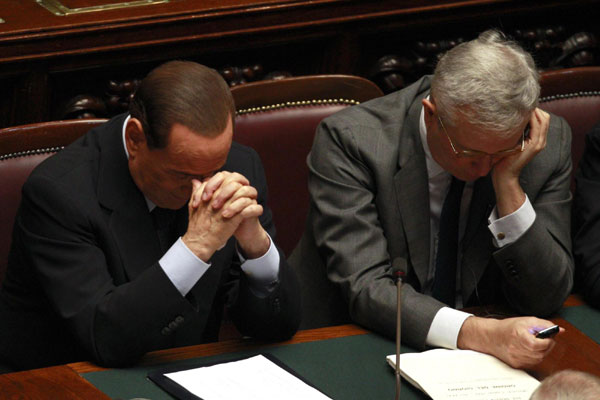Politics
Berlusconi to stay on, seek growth amid debt woes
Updated: 2011-08-04 08:13
(Agencies)

Italy's Prime Minister Silvio Berlusconi (L) and Finance Minister Giulio Tremonti attend a debate in the upper house of parliament in Rome August 3, 2011. [Photo/Agencies] |
After a volatile day on markets, in which Italian borrowing rates touched a record high, Berlusconi told parliament that Italy "has not done little" in response to the crisis. "But we know there is more to do."
Addressing the lower house of parliament in Rome after financial markets had closed for the day, he said Italy needs to promote competitiveness and growth.
"Our duty as the government is to work for the good of Italy, making the economy take off," he said.
Berlusconi said the euro70 billion ($99 billion) in austerity measures passed last month will balance the budget by 2014, and emphasized that euro9 billion infrastructure projects mostly in the poorer south approved earlier Wednesday will help promote growth.
He emphasized that Italian banks remained solid and that investors who were pushing up Italy's borrowing rates did not recognize the country's fundamental strengths: a stable banking system, low levels of private sector indebtedness _ half that of the United States and Britain _ and a strong entrepreneurial spirit.
"I am speaking to you as an entrepreneur with three companies listed on the stock exchange," Berlusconi said, to boos from the opposition benches.
Growing market jitters have intensified opposition calls for Berlusconi's resignation, with center-left leaders claiming there was a lack of international confidence in the Italian leader. But Berlusconi was firm that he will stay in office until his mandate expires in 2013.
"Everyone does his own part: stability has always been the winning strategy against speculation," he said.
Italy's 10-year borrowing rate briefly spiked to 6.21 percent before easing to 6.06 percent.
Spain was also under the market spotlight, forcing Prime Minister Jose Luis Rodriguez Zapatero to delay his vacation by two days. Its 10-year borrowing rate edged down to 6.23 percent from Tuesday's euro-era high of 6.45 percent.
Both countries' yields have soared in recent days, suggesting investors are worried they may eventually need help with their debt.
"The upward march in Spanish and Italian bond yields is evidence of the relentlessness of the sovereign debt crisis," said Jane Foley, an analyst at Rabobank International.
The revival of the debt crisis is mainly due to a global sell-off by traders of any investments that appear risky _ such as the bonds of Italy and Spain _ after indicators suggested the U.S. economy is slowing sharply.
Whereas both Italy and Spain could continue borrowing at their current rates, their financing costs would increase, adding to the debt pile that is the source of market worries. The fear is that the global market turmoil will push the two countries closer toward needing a bailout.
Bailouts for Spain or Italy would be far more expensive than the rescue packages agreed for Greece, Ireland and Portugal and would likely overwhelm the eurozone's finances.
Last month, the leaders of the 17 eurozone countries agreed to changes to the region's rescue fund that would allow it to act pre-emptively, for instance by providing short-term loans or buying up ailing bonds on the open market, before a country is in a full-blown crisis.
However, actually implementing those decisions takes time, and in many cases the changes to the fund's powers will have to be approved by national parliaments, most of which are currently on summer break. At the same time, analysts worry that the fund is currently too small to make much of a difference.
European Commission President Jose Manuel Barroso said Wednesday that the selloffs of Italian and Spanish bonds "reflect a growing concern among investors about the systemic capacity of the euro area to respond to the evolving crisis."
Barroso said he would write to eurozone leaders and urge them to implement the decisions taken last month "without delay."
Earlier Wednesday, Finance Minister Giulio Tremonti held talks with some of the currency union's top officials. He traveled to Luxembourg to meet Jean-Claude Juncker, who chairs the regular meetings of eurozone finance ministers, and spoke on the phone with the EU's Monetary Affairs Commissioner Olli Rehn.
Rehn expressed full confidence that Tremonti and the Italian authorities in general are taking the necessary measures to get the country's economy back on track.
Italy has debt nearing 120 percent of economic output, but had been viewed for months with calm by bond markets. The country has low levels of private debt and has not had the real estate boom and bust that caused trouble for the United States, Spain, and Ireland.
But it suffers from chronically low growth and investors doubt the government's willingness and ability to push through painful economic reforms.
Spain, meanwhile, is struggling to recover from nearly two years of recession. The country is struggling with a swollen deficit and a jobless rate that stands at a eurozone high of nearly 21 percent.
Zapatero delayed his vacation to monitor market developments, and held an emergency meeting with Finance Minister Elena Salgado and Development Minister Jose Blanco.
Salgado told reporters recent market developments are worrying, but she added that they may not last for long. The situation is not viewed as "extremely serious," she said.
Markets may easily return to normalcy during the typically slow August trading month, the minister said. "It is a tense situation, but Spain is dealing with it in a relatively calm way," Salgado said.
Zapatero earlier called European Council President Herman Van Rompuy Wednesday and they agreed that the new Greek rescue plan and the "reform of the European mechanism" to help eurozone countries should be approved as soon as possible by European governments to shore up confidence in markets, the premier's office said in statement.
Zapatero has called early general elections, largely due to pressure from the financial crisis and because he wants a new government to manage the troubled economy from the start of the year.
By the market close in Europe, shares on the Milan Stock Exchange fell 1.5 percent, adding to several days of massive losses, while Spain's main index closed down 0.9 percent.
E-paper

Double vision
Prosperous Hangzhou banks on creative energies to bridge traditional and modern sectors
Minding matters
A touch of glass
No longer going by the book
Specials

Ancient plate broken
An ancient porcelain plate was accidentally destroyed during a research in the Palace Museum.

Selfless actions
A 20-year-old girl becomes an Internet star for giving her first kiss to a drowning old man.

Space race
Homebuyers are learning the hard facts of supply and demand: too many cars and too few parking spaces.
